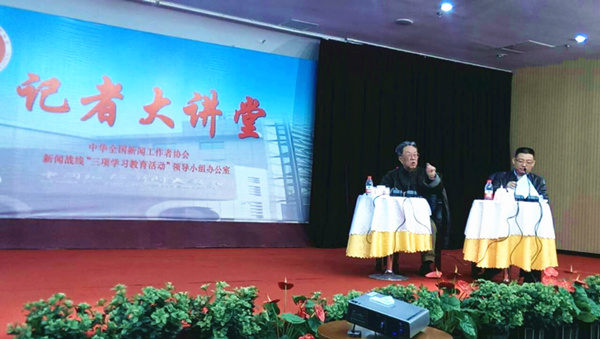 |
|
Wang Meng (left), a famous writer and former Chinese Minister of Culture, gives a key speech at the event. [Photo by He Keyao/Chinaculture.org] |
Traditional values and ideals, whether Confucianism or the wisdom of Laozi, are the treasures of Chinese culture and society and their wisdom is still inspiring and applicable today, Wang Meng, a famous writer and former Chinese Minister of Culture told Chinese journalists on December 5.
Organized by the All-China Journalists' Association, the "Journalists' Lecture" was held in Beijing at the beginning of this month. Wang Meng, as the keynote speaker of the event, explored the core values of Chinese traditional culture and discussed their application to the contemporary social context. Over a hundred journalists from mainstream Chinese news agencies attended the lecture.
Wang pointed out that the significance of cultural values lie in their ability to purify the heart and increase morality. According to the teachings of The Analects of Confucius, governing the country with virtue and morality wins the people’s support and admiration. Wang held that the moral idealism in Confucianism is the core of Chinese social ideology, which is essential for sustaining the stability and harmony of the country.
From the Taoist political ideal "Wu Wei Er Zhi" (which means "to govern without interfering with the natural rules"), and Confucius and Laozi's "Jian Zheng Fang Quan" (which means "to curb the power of bureaucrats, rein in government spending"), to Dai Sheng's (an official and scholar from Western Han Dynasty) proposal "Tian Xia Da Tong" ("supreme harmony worldwide"), all demonstrate a clear thread of Chinese political and social wisdom, which forms the foundation of the "China Dream" in contemporary times, according to Wang.
"It is the traditional culture that shapes people's heart and values, which cannot be ignored." Wang stressed the effect of culture on the construction of ideology and social norms.
He repeatedly emphasized the concept of "Ren" and "Dao"- two key elements of Confucianism and Taoism. "Ren" (meaning "kindness") advocates putting oneself in the place of another and to love others; "Dao" (meaning "law") advocates following natural rules and not to go against them. These ideals are rooted in Chinese culture and are easy for Chinese people to adopt, Wang said.
Moreover, Wang also indicated that cultural values have a strong influence on moral supervision. He demonstrated this social mechanism by defining and contrasting "Jun Zi" (a noble man) and "Xiao Ren" (a base person).
Advocating traditional culture doesn't mean a complete return to old customs, Wang emphasized. "What we need is by no means to copy the past," he said. Chinese traditional culture needs to be integrated into the new cultures of contemporary times (such as the "May Fourth New Culture" and "People's Revolutionary Culture" in the modern history of China) so that it can flourish in modern society, he said.
|
|
|
|
|
|
|
|
